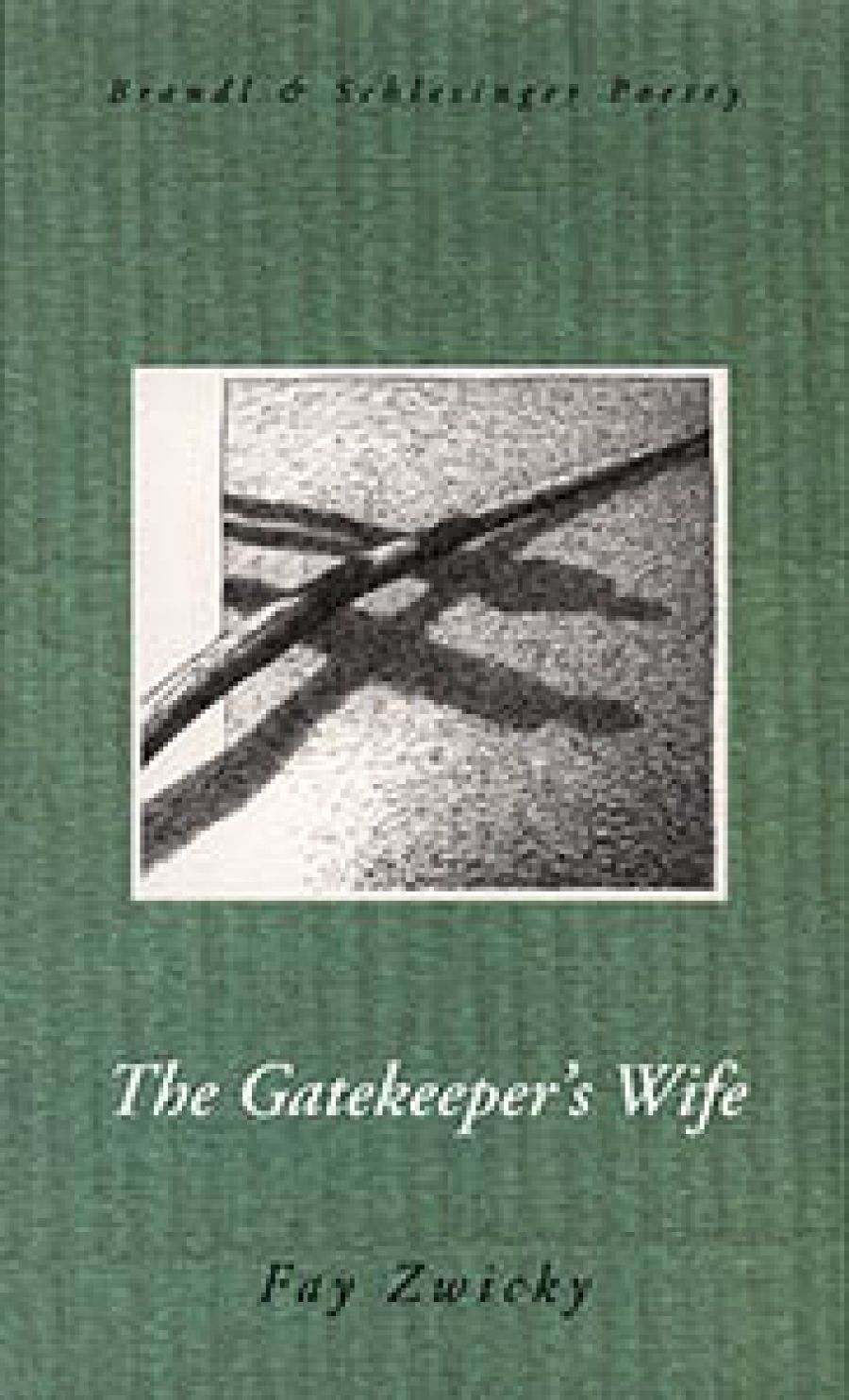
- Free Article: No
- Contents Category: Poetry
- Review Article: Yes
- Article Title: The Gaze That Kills
- Online Only: No
- Custom Highlight Text:
It’s been four years since Fay Zwicky’s Selected Poems 1970–1992 was published by the University of Queensland Press in their long-running poetry series with the infamous pencil portrait covers. The Gatekeeper’s Wife is one of two books in a poetry series by a relatively new publisher. The design is reminiscent of the wonderful Cape Editions edited by Nathaniel Tarn in the sixties. Brandl & Schlesinger have established this series with Fay Zwicky and Rhyll McMaster, two of this country’s major poets. They have done well by them with these fine looking books.
- Book 1 Title: The Gatekeeper’s Wife
- Book 1 Biblio: Brandl & Schlesinger, $16.95 pb, 71 pp
Zwicky had a Louis Kahan portrait for her UQP book, and has since written a poem that fills in the connections between the poet and artist:
they are both of the same archaeological stratum
marked Tough, crossers of many bridges in
countries marked Entrance or Exit.
This poem goes on, unwinding the strands, discussing ideas that run through this book like arteries. Attention to detail coupled with tight free verse creates a seemingly pellucid surface, but there’s a measured irony being metered out in what’s withheld from the narrative,
She has always been the watcher,
seen the scars, discolourations, damage, loss,
creeping arthritis, middle class teeth scraped
twice a year. Paying attention
to lifelong facts her lot.
Notice that enjambment of ‘attention / to’ – this is relentless poetry, finely crafted, packed with detail, sprung with black humour; it is poetry that pays attention to itself and its subject simultaneously. Zwicky’s ‘free verse’ is similar in its music to Elizabeth Bishop’s clipped iambics, where the voice depends on rhythmical expectations that are set up to be frustrated and then fulfilled from one line to the next. The rhetoric is free ranging, from lyric to satiric, it can swerve or lash out from one stanza to the next. Taking up Kahan’s portrait on her Selected Poems, Zwicky uses it as a merciless mirror: ‘She’s a strong woman, he says, adding a hint of bitterness/to the mouth.’
The idea of the gaze that kills hovers around several poems in this book. Zwicky looks into that gaze, ‘who is watcher, who is watched,/ like God, beyond forgiveness.’ In a poem after Arthur Boyd’s painting Bride Drinking From a Pool:
Bride-haunted,
your own face is thrown back
larval in the pool of exile. Without
hope of reward you reach down
to drink, trusting
to be fed.
The poems breed ideas, the language is so cut back, so well put together, that it is easy to skip over them. These poems are vintage Zwicky: they are sly as well as blunt, but they repay the reader with each reading. A marvellous elegy for Primo Levi, ‘Banksia Blechifolia’, gives some indication of the spare rigour that pulls the ideas into words that flower:
Colourless, odourless,
no use or beauty,
why would you look?
Barely exotic since I’m born here,
bearer of crueller histories
than your burning fields recall.
Seeded by typhoons, I’ve waited
years to raise my barbed and desperate
flower, colourless, odourless
and armoured. But reaching
reaching always skyward.
There is a great sorrow in this book but it is not self-pitying, it becomes, through poetry, a grief that grows from anger to wisdom, a grief that is put to work: in ‘Groundswell for Ginsberg’, ‘Nothing speaks louder than unwritten poems, battening down silent grief our first suffering’s source’. This poem, written before Ginsberg’s death, makes a fine elegy for the poet who helped release Zwicky from the constraint of her academic background. She wrote her breakthrough tide poem, Kaddish, published in 1977. After that came, Ask Me, the book that won the WA Premier’s Award for Poetry in 1991. Here, the elegiac love poem ‘For Jim 1947–1986’ created a kind of dark muse for Zwicky that has followed her through the years and has surfaced again in The Gatekeeper’s Wife. This muse touches down in the title poem, where ‘memory is only half the story’ and where ‘You’re always in my mind/ Coming and going’. The poet says of this figure, ‘I learned a gesture/ From you, a slight/Turning away’. This gesture grows and becomes the sort of thing that Eurydice might have said to Orpheus. Here we return to the idea of ‘the killing glance’:
You’d hardly believe
The woman I grew to be
Watching you
Turning away.
This ‘gesture’ moves through the five page title poem and then comes up again in the poem following it, ‘Orpheus’, where ‘you are trying to answer/what might have been asked/what never was asked.’ Who is ‘you’ Orpheus? The reader? Eurydice? Here Zwicky brings her poetry into a supreme focus, in a minimalist style so finely wrought that craft has become pure thought, where to keep ‘the pen on the move/keeps you somewhere near.’ Zwicky is writing what most poets achieve in so few poems, a poem that ‘writes against our oblivion’. There is more, she brings her muse out of the shadows and together they write:
So long as there is a you
there is a me.
I have it in writing.
Death will come when you ask
and I stop turning back
to see who is asking.
It’s all there in two stanzas, the precision, lucidity, and profound ease of pure poetry – but this is the pay-off – that the reader will achieve when reading Zwicky’s Selected Poems in conjunction with The Gatekeeper’s Wife. This fine book is printed on a creamy stock, with drawings by Hanna Kay that are detailed and subtle enough to match Zwicky’s profound elegies and dark love songs.


Comments powered by CComment